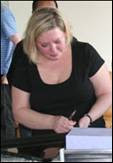
The following post has been submitted by guest blogger JP Ganong, who does all of the driving here in Israel. I am just too terrified to get behind the wheel.
.
It isn't easy to navigate Israeli cities. Most roads twist and turn and change names with little warning. There are signs with arrows indicating which way you should go if you want to go to some other street, but nothing to indicate how to continue on the one you're on. Worse, there are plenty of one-way streets so you can't retrace your path when you inevitably miss your turn. Then when you want to turn there are signs posted that no turns are permitted. I'm convinced that the second Lebanese War occurred when the IDF got into the wrong lane and couldn't turn around.
Israelis are championship lane changers. Even on the open road they alternate lanes as if they were walking across hot coals. They can squeeze into even the tiniest gaps. It's like parallel parking at 75 miles per hour.
You could probably drive in Israel if you were blind but not if you're deaf. Israelis completely ignore emergency vehicles with their flashing lights. It's as if they were at some sort of disco. I've even seen people speed past police cars. They only pay them any heed when they have their sirens on. And if you're deaf you can't hear the most commonly spoken language in Israel, the car horn.
The car horn is used for a variety of purposes. For example, a short urgent horn while changing lines means, "This lane is occupied." A medium, insistent honk at a light means, "The light has turned yellow for the other direction, you should start accelerating". Two honks and headlight flashing from behind means, "I want to drive a higher multiple of the speed limit." And a long, agonized honk from a parked car means, "Someone triple-parked where I was double-parked and now I'm boxed in." I have heard many other car horns and even regional dialects but it is difficult to translate with the phrasebook while dodging motorcycles. So far the only thing I can say in my rudimentary car horn is, "Please don't kill me". It sounds like kind of shrill squeak.
Israelis are more predictable than US drivers. You don't know whether a US driver will let you in or whether he will be a jerk and accelerate. All Israeli drivers just go. In Israel, if you decide to let someone in as you would in the U.S., they won't budge. The secret is to act momentarily distracted by the radio, or by a map or the collar of your shirt. Then the Israeli instincts will kick in and they will zoom ahead of you. You can try to honk and wave and eventually they'll get the idea but they won't take any pleasure in it and you'll hold up traffic.
Another thing to get to used to is motorcycles and scooters. Traffic laws do not apply to motorcycles and scooters. Newton's Laws do not apply to them either. Motorcycles go between lanes, along the shoulder, up the median, across the sidewalk and circle your car twice before leaving the driveway. Looking both ways when crossing the street is not sufficient. You have to look both ways, up, down, behind you, around the corner and under the bushes before you can be sure that no motorcycle is approaching. We had to lay strips of spikes to keep them out of the bedroom. At first I was really uneasy about motorcycles passing me on all sides at high speed and between buses But I take some consolation in the fact that if I ever am in an accident that two or three motorcyclists will soften the blow of the collision.
Taxi drivers have to work particularly hard in Israel to distinguish themselves as crazy drivers. They do this by straddling lanes for miles, picking up imaginary fares in tunnels and using their turn signal only when changing three or four lanes at once.
Despite all this, there seem to be remarkably few crashes in Israel. I think that this must be due to drivers expecting everyone to drive like a maniac. I have seen evidence of only one serious accident. The wreckage was almost like a Hollywood prop. It looked like the Death Star at the end of the movie. Like it had suffered a head-on collision. Several. It was as if the police had left it there as a deterrent to other drivers.
The accident report will surely reveal that the root cause was a car horn malfunction.




2 comments:
The photo shows the most common bumper sticker in Israel, the red and white caution stripe. This is because of parallel parking and all of the tailgating in Israel. This morning some guy was tailgating so badly that he could read my owners manual in my closed glove compartment. It's just as well since I never read it as it's in Hebrew. - jpganong
Hot damn Jeff, I was laughing so hard I could barely type this back to you! Sounds like NY meets Europe style driving over there!
I can't remember the last time I checked my front bushes for motorcyclists! Maybe I can get them to scare off the racoons...
Post a Comment